 Libri di John Dewey su Unilibro.it
)
Libri di John Dewey su Unilibro.it
)
|
|
2008 |
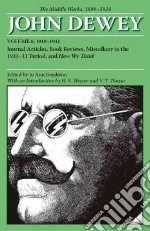 Title :
The Middle Works of John Dewey 1899-1924
Title :
The Middle Works of John Dewey 1899-1924Author: Dewey John, Boydston Jo Ann (EDT), Thayer H. S. (INT), Thayer V. T. (INT) Publisher: Southern Illinois Univ Pr € 42,50
|
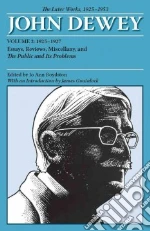 Title :
John Dewey The Later Works, 1925-1953
Title :
John Dewey The Later Works, 1925-1953Author: Dewey John, Boydston Jo Ann (EDT), Walsh Bridget A. (EDT), Gouinlock James (INT) Publisher: Southern Illinois Univ Pr € 42,50
|
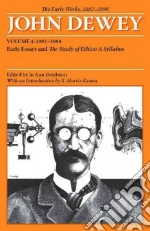 Title :
The Early Works of John Dewey, 1882 - 1898
Title :
The Early Works of John Dewey, 1882 - 1898Author: Dewey John, Boydston Jo Ann (EDT) Publisher: Southern Illinois Univ Pr € 42,50
|
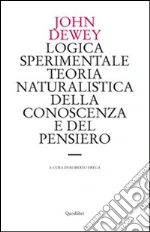 Title :
Logica sperimentale. Teoria naturalistica della conoscenza e del pensiero
Title :
Logica sperimentale. Teoria naturalistica della conoscenza e del pensieroAuthor: Dewey John; Frega R. (cur.) Publisher: Quodlibet € 30,00
Scontato: € 28,50
|
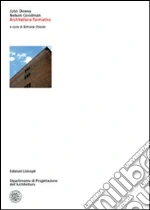 Title :
Architettura formativa
Title :
Architettura formativaAuthor: Dewey John; Goodman Nelson; Chiodo S. (cur.) Publisher: Unicopli John Dewey e Nelson Goodman, filosofi cruciali del Novecento, ragionano nei quattro articoli qui tradotti (Pensiero affettivo e La funzione educativa di un museo di arti decorative di John Dewey e La fine del museo? e Come gli edifici significano di Nelson Goodman), con una continuità teorica notevolissima, sulla destinazione dell'oggetto architettonico, soprattutto museale, quando ha l'ambizione di possedere un potere 'formativo', capace di trasformare sia gli oggetti sia gli individui con i quali interagisce. Le considerazioni dei due filosofi sottolineano e caratterizzano il potere creativo che il soggetto, insieme con i suoi artefatti, ha assunto con una radicalità particolare, in qualche caso anche critica, nella contemporaneità. Gli articoli sono introdotti da un saggio di Simona Chiodo, che ha anche tradotto i materiali. € 15,00
|
 Title :
Rifare la filosofia
Title :
Rifare la filosofiaAuthor: Dewey John Publisher: Donzelli Il compito, l'oggetto e le questioni precipue della filosofia emergono dalle tensioni e dai travagli della vita collettiva in cui essa nasce, e i suoi problemi specifici variano con i cambiamenti sempre in atto, portando talvolta a una crisi e a un punto di svolta nella storia', scriveva così John Dewey nell'introduzione a questa vera e propria summa del suo pensiero. Pubblicato nel 1919, il testo fu riproposto venticinque anni dopo, con una lunga introduzione in cui l'autore ribadiva la necessità di una riforma radicale della riflessione filosofica: una ricostruzione capace di tener conto, e di ricondurre nel campo umano e morale, l'enorme potenzialità del metodo empirico che ha portato al successo delle scienze naturali. Contro tutti i detrattori della scienza, Dewey mostra che è proprio da un esame dei procedimenti dell'analisi scientifica che possiamo ricavare i nostri ideali democratici. Per questo egli propone, anche in filosofia, un atteggiamento sperimentale. Il suo modello per la discussione pubblica democratica è quello di una comunità di ricercatori scientifici sinceramente impegnati a risolvere un problema. In effetti, nella scienza l'intelligenza e la qualità delle soluzioni dei problemi emergenti sono direttamente collegate alla democraticità della ricerca, cioè alla possibilità da parte di tutte le persone coinvolte di scambiarsi informazioni e avanzare critiche e considerazioni in modo libero e aperto. € 14,50
Scontato: € 13,78
|
|
2007 |
 Title :
Human Nature and Conduct
Title :
Human Nature and ConductAuthor: John, Dewey Publisher: BERTRAMS PRINT ON DEMAND € 21,20
|
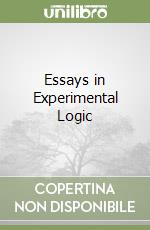 Title :
Essays in Experimental Logic
Title :
Essays in Experimental LogicAuthor: Dewey John, Hester D. Micah (EDT), Talisse Robert B. (EDT), Burke Tom (INT), Shook John R. (CON) Publisher: Southern Illinois Univ Pr € 59,80
|
|
2006 |
 Title :
Public and Its Problems
Title :
Public and Its ProblemsAuthor: Dewey John Publisher: Ohio Univ Pr In The Public and Its Problems, a classic of social and political philosophy, John Dewey exhibits his strong faith in the potential of human intelligence to solve the public's problems. In his characteristic provocative style, Dewey clarifies the meaning and implications of such concepts as 'the public,' 'the state,' 'government,' and 'political democracy.' He distinguishes his a posterior reasoning from a priori reasoning, which, he argues permeates less meaningful discussion of basic concepts. Dewey repeatedly demonstrates the interrelationships between fact and theory. € 15,90
|
|
|
2005 |
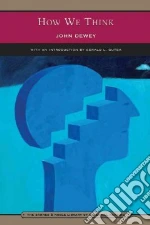 Title :
How We Think
Title :
How We ThinkAuthor: Dewey John, Gutek Gerald L. (INT) Publisher: Barnes & Noble € 8,00
|
 Title :
Art As Experience
Title :
Art As ExperienceAuthor: Dewey John Publisher: Penguin Group USA Based on John Dewey's lectures on esthetics, delivered as the first William James Lecturer at Harvard in 1932, Art as Experience has grown to be considered internationally as the most distinguished work ever written by an American on the formal structure and characteristic effects of all the arts: architecture, sculpture, painting, music, and literature. € 18,80
|
 Title :
Democrazia, liberalismo e azione sociale
Title :
Democrazia, liberalismo e azione socialeAuthor: Dewey John; Margiotta U. (cur.) Publisher: Pensa Multimedia € 16,00
|
|
2004 |
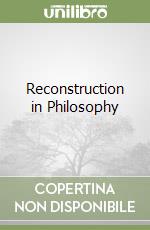 Title :
Reconstruction in Philosophy
Title :
Reconstruction in PhilosophyAuthor: Dewey John Publisher: Dover Pubns € 10,70
|
 Title :
Democracy and Education
Title :
Democracy and EducationAuthor: Dewey John Publisher: Dover Pubns € 15,20
|
 Title :
Democrazia e educazione
Title :
Democrazia e educazioneAuthor: Dewey John Publisher: Sansoni Fu Bertrand Russell a definire John Dewey il più importante filosofo americano del XX secolo per la sua capacità di riprendere e sviluppare la grande tradizione empirista e pragmatista degli Stati Uniti. La scuola pedagogica deweyana nasce infatti dalle profonde radici filosofiche di un pensiero che pone al centro l'esperienza umana. Se l'intelligenza ha lo scopo di guidare la persona attraverso la vita, l'educazione assume il ruolo centrale di palestra di dialogo e capacità critica, dove i futuri cittadini possono sviluppare le proprie individualità in vista dell'azione democratica, esercizio politico di comunicazione e ascolto. Nel libro Dewey affronta argomenti come il gioco e il lavoro, l'insegnamento accademico e l'istruzione professionale. € 29,00
|
|
2003 |
 Title :
Scritti politici
Title :
Scritti politiciAuthor: Dewey John Publisher: Donzelli € 18,00
Scontato: € 17,10
|
|
|
2002 |
 Title :
Human Nature and Conduct
Title :
Human Nature and ConductAuthor: Dewey John Publisher: Prometheus Books Originally appearing in 1922, Dewey's treatise on social and moral aspects of psychology discusses the essential components of human nature. Focusing on the roles of habit, impulse, and intelligence, Dewey describes the formation of individual character and the capacity for social life. The human abilities to act creatively, to experiment, to adjust to the environment, and to make moral decisions are explored in depth. Annotation (c) Book News, Inc., Portland, OR (booknews.com) € 15,90
|
 Title :
Human Nature and Conduct
Title :
Human Nature and ConductAuthor: Dewey John Publisher: Dover Pubns € 22,30
|
 Title :
Rifare la filosofia
Title :
Rifare la filosofiaAuthor: Dewey John Publisher: Donzelli € 10,00
|
 Title :
Profiles of Jesus
Title :
Profiles of JesusAuthor: Hoover Roy W. (EDT), Borg Marcus J. (CON), Corley Kathleen E. (CON), Crossan John Dominic (CON), Dewey Arthur J. (CON), Fortna Robert T. (CON), Funk Robert W. (CON), Hedrick Charles W. (CON), Hoover Roy W. (CON), McGaughy Lane C. (CON) Publisher: Lightning Source Inc € 18,30
|
||
|
2001 |
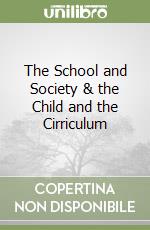 Title :
The School and Society & the Child and the Cirriculum
Title :
The School and Society & the Child and the CirriculumAuthor: Dewey John Publisher: Dover Pubns € 8,00
|
|
|
1999 |
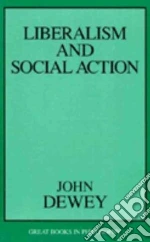 Title :
Liberalism and Social Action
Title :
Liberalism and Social ActionAuthor: Dewey John Publisher: Prometheus Books In Liberalism and Social Action, John Dewey (1859-1952), one of America's leading social philosophers, surveys the history of liberal thought from John Locke to John Stuart Mill, in his search to find the core of liberalism for today's world. While liberals of all stripes have held to some very basic values - liberty, individuality, and the critical use of intelligence - earlier forms of liberalism restricted the state function to protecting its citizens while allowing free rein to socioeconomic forces. But, as society matures, so must liberalism as it reaches out, to redefine itself in a world where government must play a role in creating an environment in which citizens can achieve their potential. Dewey's advocacy of a positive role for government - a new liberalism - nevertheless finds him rejecting radical Marxists and fascists who would use violence and revolution rather than democratic methods to achieve social objectives. € 13,90
|
 Title :
Individualism Old and New
Title :
Individualism Old and NewAuthor: Dewey John Publisher: Prometheus Books America's most renowned social philosopher John Dewey shines his powerful intellect on the serious public and cultural issues surrounding the place of the individual in a technologically advanced society. In this penetrating study, he addresses the fear that personal creative potential will be trampled by assembly-line monotony, political bureaucracy, and an industrialized culture of uniformity. Armed with his pragmatic approach and his belief in the power of critical intelligence, Dewey argues that individualism has in fact been offered a uniquely higher plane of technological development upon which to grow, mature, and redefine itself. € 13,90
|
 Title :
Il mio credo pedagogico. Antologia di scritti sull'educazione
Title :
Il mio credo pedagogico. Antologia di scritti sull'educazioneAuthor: Dewey John; Borghi L. (cur.) Publisher: La Nuova Italia € 20,14
|
|
1998 |
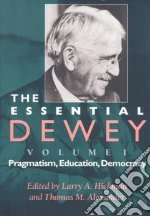 Title :
The Essential Dewey
Title :
The Essential DeweyAuthor: Hickman Larry A. (EDT), Alexander Thomas M. (EDT), Dewey John Publisher: Indiana Univ Pr In addition to being one of the greatest technical philosophers of the twentieth century, John Dewey (1859-1952) was an educational innovator, a Progressive Era reformer, and one of America's last great public intellectuals. Dewey's insights into the problems of public education, immigration, the prospects for democratic government, and the relation of religious faith to science are as fresh today as when they were first published. His penetrating treatments of the nature and function of philosophy, the ethical and aesthetic dimensions of life, and the role of inquiry in human experience are of increasing relevance at the turn of the 21st century. Based on the award-winning 37-volume critical edition of Dewey's work, The Essential Dewey presents for the first time a collection of Dewey's writings that is both manageable and comprehensive. The volume includes essays and book chapters that exhibit Dewey's intellectual development over time; the selection represents his mature thinking on every major issue to which he turned his attention. Eleven part divisions cover: Dewey in Context; Reconstructing Philosophy; Evolutionary Naturalism; Pragmatic Metaphysics; Habit, Conduct, and Language; Meaning, Truth, and Inquiry; Valuation and Ethics; The Aims of Education; The Individual, the Community, and Democracy; Pragmatism and Culture: Science and Technology, Art and Religion; and Interpretations and Critiques. Taken as a whole, this collection provides unique access to Dewey's understanding of the problems and prospects of human existence and of the philosophical enterprise. € 31,10
|
 Title :
Rifare la filosofia
Title :
Rifare la filosofiaAuthor: Dewey John Publisher: Donzelli € 18,08
|
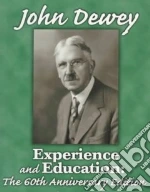 Title :
Experience and Education
Title :
Experience and EducationAuthor: Dewey John Publisher: Kappa Delta Pi € 12,20
|
|
1997 |
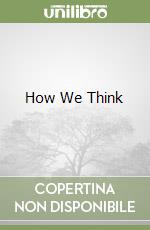 Title :
How We Think
Title :
How We ThinkAuthor: Dewey John Publisher: Dover Pubns € 9,80
|
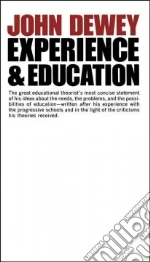 Title :
Experience and Education
Title :
Experience and EducationAuthor: Dewey John Publisher: Free Pr Experience and Education is the best concise statement on education ever published by John Dewey, the man acknowledged to be the pre-eminent educational theorist of the twentieth century. Written more than two decades after Democracy and Education (Dewey's most comprehensive statement of his position in educational philosophy), this book demonstrates how Dewey reformulated his ideas as a result of his intervening experience with the progressive schools and in the light of the criticisms his theories had received. Analyzing both 'traditional' and 'progressive' education, Dr. Dewey here insists that neither the old nor the new education is adequate and that each is miseducative because neither of them applies the principles of a carefully developed philosophy of experience. Many pages of this volume illustrate Dr. Dewey's ideas for a philosophy of experience and its relation to education. He particularly urges that all teachers and educators looking for a new movement in education should think in terms of the deeped and larger issues of education rather than in terms of some divisive 'ism' about education, even such an 'ism' as 'progressivism.' His philosophy, here expressed in its most essential, most readable form, predicates an American educational system that respects all sources of experience, on that offers a true learning situation that is both historical and social, both orderly and dynamic. € 11,60
|
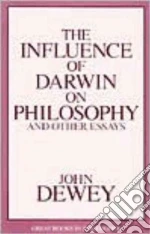 Title :
Influence of Darwin on Philosophy and Other Essays
Title :
Influence of Darwin on Philosophy and Other EssaysAuthor: Dewey John Publisher: Prometheus Books Preeminent American philosopher and educator John Dewey (1859-1952) rejected Hegelian idealism for the pragmatism of William James. In this collection of informal, highly readable essays, originally published between 1897 and 1909, Dewey articulates his now classic philosophical concepts of knowledge and truth and the nature of reality. Here Dewey introduces his scientific method and uses critical intelligence to reject the traditional ways of viewing philosophical discourse. Knowledge cannot be divorced from experience; it is gradually acquired through interaction with nature. Philosophy, therefore, has to be regarded as itself a method of knowledge and not as a repository of disembodied, pre-existing absolute truths. € 15,70
|

|

|

|

|